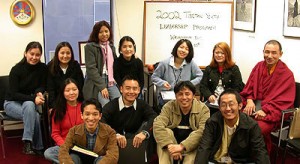
Students from the Second Annual Tibetan Youth Leadership Program
The program is designed to provide Tibetan youth exposure to different fields of activism, practical organizing skills, and opportunities necessary to become more effective leaders in their communities. The program features workshops; fieldtrips to Amnesty International, Capitol Hill, VOA and RFA; panel discussions, nonviolence and cross-cultural outreach, and special events emphasizing NGO networking, media and messaging, working with the US Congress and Administration, and organizing within the Tibetan community.
“We are excited to meet this second group of Tibetans and have prepared a multifaceted program for them,” said Tenzin Dhongthog, Program Coordinator. “The participants come from seven states with a wide range of experience,” Dhongthog added.
This year’s participants will be attending a Congressional hearing on Tibet on March 7, 2002 providing them an opportunity to get a close perspective of the United States policy on Tibet. U.S. Special Coordinator for Tibet Paula Dobriansky, Special Envoy of H.H. the Dalai Lama Lodi Gyari and ICT Board Chairman Richard Gere are testifying at the Hearing. Participants were selected from essays they submitted on the topic, “What it takes to be a leader in the Tibetan community.”
Participants of the first program have indicated that giving young Tibetans a setting to investigate, discuss, and debate issues openly was an educative process.
“We were very impressed with the participants of the first program and felt encouraged to continue the program this year,” said ICT Director Bhuchung Tsering.
Special Envoy of H.H. the Dalai Lama Lodi Gyari, Office of Tibet (New York) Representative Dr. Nawang Rabgyal, Burmese nonviolence activist Ka Hsaw Wa, Tibetan scholar Dr. Dawa Norbu, Chinese human rights activist Harry Wu, Amnesty International USA’s Advocacy Director T. Kumar, are among those experts addressing the participants in this year’s program.

